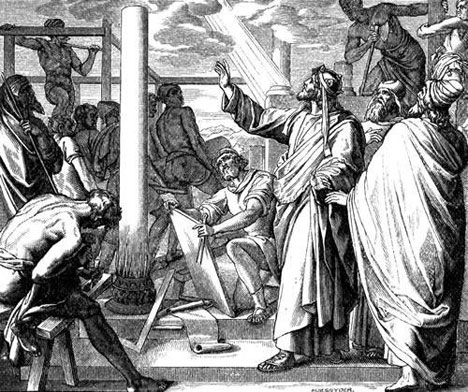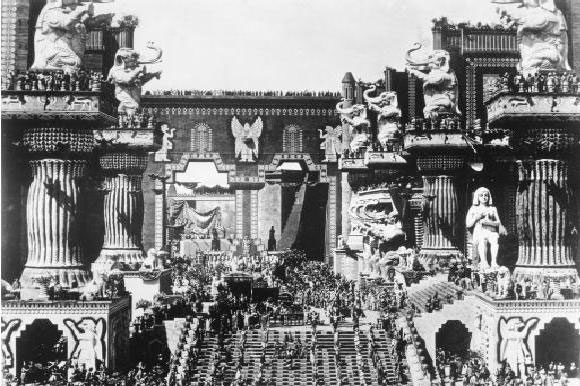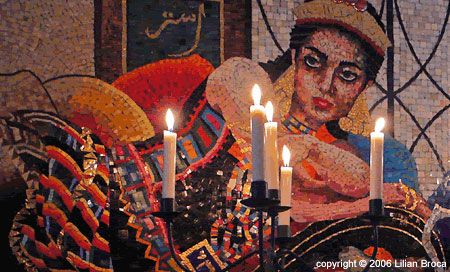Oct
18
2010

“Egypt, Judah, Edom, the people of Ammon, Moab, and all who are in the farthest corners, who dwell in the wilderness. For all these nations are uncircumcised, and all the house of Israel are uncircumcised in the heart.” - Jeremiah 9:26
Reading through the Old Testament as a young Christian, I always felt the Bible got bogged down when the Lord started pronouncing judgments upon nations other than Israel. For starters, I hadn’t paid enough attention earlier to remember who these sovereign states were. And more to the point, wasn’t God losing the plot a bit? I mean, there were plenty of other peoples during these times which aren’t even mentioned in the Bible at all.
Unfortunately, few commentators take the Bible seriously enough to understand what is actually going on. Older books will fill you in on the background, which is certainly helpful. But the big question is Why is God doing this now?, both now in history and now in the prophet I am reading?
As usual, when the structure and context of things is understood, seemingly boring “classic” texts suddenly come to life. In the case of the prophets it is a consuming fire. Continue reading
Comments Off | tags: Babylon, Creation Week, David, Egypt, Ezekiel, goliath, Literary Structure, Numbers, Numbers 5, Revelation, Solomon | posted in Bible Matrix, Biblical Theology, The Last Days, The Restoration Era
Jun
2
2010
or Disputatio with God

Re The Wrath of Love, Michael Micklow commented:
(Correction – not Michael Shover – Michael got his Michael’s crossed)
“The prophet did not have to remind God, so much as he had to remind himself of the love of God, and to see God’s judgment as the wrath of love.”
What about the dangerous yet successful Mosaic paradigm in Exodus 32:7-14? In this section, the prophet is able to approach, contest and sway God’s wrath (vv. 11-13). In response to Moses’ challenge, the text tells us, “and the Lord changed his mind about the disaster that he planned to bring on his people” (v. 14)…
… And what was the cornerstone of his defense? — the appeal to memory (v. 13). Moses cites the exodus event, and he further appeals to the covenant established with Abraham.
Continue reading
Comments Off | tags: Ascension, David, Habakkuk, Intercession, James Jordan, Maturity, Memorial, Moses, Psalms, Satan, Zechariah | posted in Apologetics, Biblical Theology
Apr
9
2010
Band of Brothers – 2

Part 1 here.
One thing the Bible Matrix demonstrates is the nature of history. Sure, it repeats itself. Everyone knows that. But our personal histories are microcosms of the lives and deaths of families, churches, nations and empires. Reading the Bible is like looking through a glass onion.
Continue reading
Comments Off | tags: Abel, Ahab, Bible history, Bible Matrix, Cain, David, Firstfruits, Genesis, Herod, Jezebel, Jonathan, Lamech, Postmillennialism, Revelation, Seth, Solomon, Systematic typology | posted in Biblical Theology, The Last Days, Totus Christus
Mar
3
2010
Band of Brothers – 1

It’s a temptation to water down the Bible to make it palatable for “normal” people (let alone watering it down for ourselves!). Problem is, before we know it, what we are teaching bears little resemblance to the actual Bible. The Bible has odd corners where we think it should be smooth, and it says nothing about many things we moderns deem crucial. So let the hungry eat cake.
Many youth leaders, and even pastors, present the Almighty as being desperate for our company. Although He is not needy, what He desires is more than relationship. He wants “friends,” but His definition of this word is not ours. Even if we don’t go down the track of using the actual phrase “heavenly buddy” in our teaching, we are still further off the biblical mark concerning friendship with God than we might have thought possible.
Continue reading
Comments Off | tags: Abraham, Compromise, David, Joseph, Masculinity, Saul | posted in Biblical Theology, Christian Life
Feb
23
2010
or Crops and Creeps
 “And because of the surpassing greatness of the revelations, for this reason, to keep me from exalting myself, there was given unto me a thorn in the flesh, a messenger of Satan to buffet me, in order to keep me from exalting myself. Concerning this I entreated the Lord three times that it might depart from me. And He has said to me, ‘My grace is sufficient for you, for power is perfected in weakness.’ Most gladly, then, I will rather boast about my weaknesses, that the power of Christ may dwell in me. Thus, I am well content with weaknesses, with insults, with distresses, with persecutions, with difficulties, for Christ’s sake; for when I am weak, then I am strong.” —2 Cor. 12:7-10
“And because of the surpassing greatness of the revelations, for this reason, to keep me from exalting myself, there was given unto me a thorn in the flesh, a messenger of Satan to buffet me, in order to keep me from exalting myself. Concerning this I entreated the Lord three times that it might depart from me. And He has said to me, ‘My grace is sufficient for you, for power is perfected in weakness.’ Most gladly, then, I will rather boast about my weaknesses, that the power of Christ may dwell in me. Thus, I am well content with weaknesses, with insults, with distresses, with persecutions, with difficulties, for Christ’s sake; for when I am weak, then I am strong.” —2 Cor. 12:7-10
What was Paul’s thorn in the flesh? Theories abound, from a bad temper, to bowlegs, to eye trouble and even epilepsy. Why is it that so many commentators fail to check their concordances for “previous.” These days, with Bible wordsearch software, we have no excuse.
Continue reading
Comments Off | tags: Bible Matrix, Corinthians, David, Paul, Saul | posted in Biblical Theology, The Last Days
Feb
19
2010

or Smells Like Holy Spirit
A friend recently gave me a unique gift. With some difficulty and great expense, he sourced the ingredients for the anointing oil of the Aaronic priesthood and I was the grateful recipient of a small, blue vial.
The scent of the oil is intoxicating. You breathe it in and in some strange way you can “taste” it as it goes down. It is extremely complex and yet a single fragrance. Continue reading
Comments Off | tags: Ark of the Covenant, Atonement, Covenant Theology, Creation Week, David, Esther, Ezekiel, Genesis, Greater Eve, Incense Altar, James Jordan, Peter Leithart, Resurrection, Saul, Tabernacle | posted in Biblical Theology, Quotes, The Last Days, The Restoration Era
Feb
11
2010
 God took on a body, from the dust, in Adam. A trillion particles of inanimate, dead stuff pulled together and organised into the most complex system in the cosmos, an organic machine capable of feats we are yet to discover.
God took on a body, from the dust, in Adam. A trillion particles of inanimate, dead stuff pulled together and organised into the most complex system in the cosmos, an organic machine capable of feats we are yet to discover.
Adam, as Covenant head, also took on a “body.” A Divine Handful of flesh and bone, dead or dying by any human measure, organised into a being more palatial and lavish than any male eye is worthy to behold.
Continue reading
3 comments | tags: Abraham, David, Film, goliath, Herod, Nimrod, Satan, The flood, Totus Christus, Totus Diabolus | posted in Biblical Theology, The Last Days, Totus Christus
Feb
1
2010
or Timeless Truth is a Tree

“Let his days be few, and let another take his office.” Psalm 109:8
The imprecatory Psalms seem to contradict the instruction of Christ to love our enemies. Ben Myers recently noted a campaign to pray for President Obama, to pray Psalm 109:8, that is:
Apparently some Southern Baptist pastors have been using Psalm 109:8 as a prayer for Obama’s death: “May his days be few; may another take his place of leadership. May his children be fatherless, and his wife a widow.” This even inspired a line of creepy bumper stickers and T-shirts that read “Pray for Obama.”
One of these pastors says: “You’re going to tell me that I’m supposed to pray for the socialist devil, murderer, infanticide, who wants to see young children, and he wants to see babies killed through abortion and partial-birth abortion and all these different things. Nope. I’m not gonna pray for his good. I’m going to pray that he dies and goes to hell.”
Continue reading
3 comments | tags: Abortion, David, Esther, Obama, oikoumene, Politics, Psalms, Solomon, Vindication, Wisdom | posted in Quotes, The Restoration Era
Jan
20
2010

Here’s a charming quote discovered and posted by Doug Wilson over a year ago. Being exactly the opposite of the so-called “party” image portrayed on TV and in glossy mags, it kind of stuck with me. It is not sinful like they are, yet it is so “incorrect” that it must be true.
Continue reading
2 comments | tags: David, Doug Wilson, Ecclesiology, Esther, Food laws, Postmillennialism, Robert Farrar Capon, Saul, Solomon | posted in Biblical Theology, Christian Life
Jan
15
2010

6. Jesus Christ was not judge of the quick and the dead, because (according to preterists) He only judged the dead.
Jesus judged between the living and the dead in AD70. The true bride and the false bride were bodies of living people. Of course, part of the true bride was the Old Covenant saints (those “under the Altar”) who were dead.
Continue reading
4 comments | tags: Atonement, Daniel, David, High Priest, James Jordan, Leviticus, Peter Leithart, Postmillennialism, Saul, Temple | posted in Against Hyperpreterism, Biblical Theology



































